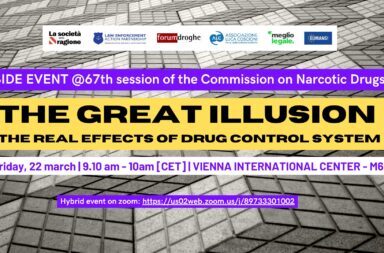In tema di droghe “C’è qualcosa di nuovo oggi nel sole…”, come avrebbe detto il poeta: cioè in due paesi dell’Est europeo con legislazioni fortemente proibizioniste si stanno muovendo qualificate iniziative mirate a realizzare almeno la depenalizzazione del possesso di modiche quantità di droga per uso personale.
Le due iniziative, guardacaso, decollano proprio in paesi a stretto contatto di gomito con la fortezza ultraproibizionista di Putin. Da sud si sta muovendo la Georgia – non lo Stato americano, ma proprio la patria caucasica di Joseph Vissarionovich Stalin. Nell’ambito del Georgia HIV Prevention Project, finanziato dall’agenzia statunitense USAID, si è avviata una importante iniziativa con scopi conoscitivi e propositivi, al fine di promuovere al livello parlamentare e governativo cambiamenti normativi e operativi rispetto agli attuali indirizzi proibizionisti.
Allo stesso tempo si sta sviluppando in Polonia un movimento avviato con un forte e articolato manifesto a firma di esponenti politici – l’ex presidente della repubblica Aleksander Kwasniewski, alcuni ex-ministri (della sanità, della cultura e dell’agricoltura) – e di una quarantina di personalità autorevoli del vivace mondo polacco della letteratura, dell’arte, del cinema, della scienza (particolarmente noto in Italia è il sociologo Zygmunt Bauman per i suoi libri e articoli spesso tradotti nella nostra lingua). Il documento mette chiaramente in evidenza gli effetti perversi della legislazione proibizionistea: cioè le norme nominalmente dirette alla repressione di traffico e spaccio colpiscono ben pochi trafficanti e spacciatori e moltissimi soggetti beccati con modeste quantità di droga per uso personale.
Non è al momento prevedibile, ovviamente, l’esito di tali iniziative. Tuttavia appaiono particolarmente significative queste levate di scudi in paesi che per secoli sono state provincie dell’impero degli zar e poi di quello sovietico, del quale i principali eredi – Russia e Ucraina – hanno norme e politiche antidroga che arrivano sino alla proibizione del metadone e al divieto categorico di qualsiasi misura di riduzione del danno (e infatti in Russia il 90% dei consumatori per via iniettiva è sieropositivo o ammalato di AIDS). E appare significativo anche il sostegno alla iniziativa georgiana di un’agenzia pubblica proprio di quegli Stati Uniti che da sempre impongono ai loro satelliti, per il tramite dell’ONU, le politiche proibizioniste e repressive.
Former Polish President and other prominent figures call for drug liberalization in Poland
14 December 2010 – Warsaw – Criminalisation of drug possession does not help to decrease illicit drug consumption. Instead, it distracts the attention and energy of the police from the real originators of the problem: mass producers and major and minor drug dealers – write the signatories of the letter of support for liberalizing drug policy in Poland. Among them are former President of Poland Aleksander Kwasniewski and a world-famous sociologist, Zygmunt Bauman. Signatories also include writers, artists and respected public figures.
Drug policy is a complex field where criminal issues intersect with matters of public health. Thus the law ought to be created rationally – in line with scientific data not stereotypes, with practical experience not mythology. Excessive repression is not conducive to solving social problems as it often escalates them. It preserves public opinion’s fears and reinforces harmful prejudices.
Signatories of the open letter urge the government to advance proceedings on amendments to the drug policy bill that has now reached the parliament. If accepted, a prosecutor would be entitled to discontinue legal proceedings against a person suspected of possessing a minor quantity of an illicit substance for personal use provided that the social harm of the deed is insignificant or the punishment would prove futile.
“Apart from advancing work on the bill, we expect a table of data stating what exactly is meant by minor quantities for each enlisted substance to be added as an annex to the bill,”says Karolina Wal?cik of Krytyka Polityczna, the organization which initiated the letter. “Such a solution is a small step which will help focus the efforts of enforcement agencies and the judiciary on real criminals that are drug dealers and traffickers, not on occasional users.”
In September a proposal of what limits could be defined for each illicit substance was announced by the Polish Drug Policy Network, an organization advocating rational drug policy in Poland which brings together experts, therapists and drug users, amongst others.
“The amendment we care about was introduced to the parliament in September but until now the bill hasn’t even had its first reading.” says Marek Balicki, a member of Parliament and former minister of health. “The current restrictive law has been binding in Poland for ten years and now it clearly shows that the goals it established have not been met. The time has come to verify those goals.”
Article 62.1 of the current drug law states that possession of any amount of an illicit drug is subject to imprisonment for up to three years. Even though the originators of the bill claim that the law was targeted at drug dealers, statistics show that after the law was introduced the number of arrested and tried dealers has not risen. In the majority of cases, those arrested were occasional users, possessing minimal quantities of marijuana, often less than one gram. According to the Polish think tank the Institute of Public Affairs, the execution of article 62.1 costs the state budget about 80 million Polish Zloty (ca. 20 million Euro) a year at a cost of over 2,500 Zloty (ca. 600 Euro) for each arrested offender. Moreover, the study shows that half of the policemen interviewed admit that the current law is conducive to abuse and is in fact abused. Instead of going after drug dealers and retailers, law enforcement officials choose the much easier option of focusing on people who possess minor amounts of illicit substances, which is an easy way to augment statistics.
In addition, the proposed amendment includes provisions for drug dependence treatment. Experts admit that access to substitution treatment in Poland is still extremely limited. Lack of access to such treatment in the north of the country was subject to criticism by Anand Grover, UN Special Rapporteur for Health.
Experts say that current Polish drug law is costly, infringes human rights and proves unconstitutional as it does not fulfill the constitutional criterion of proportion of punishment to the unlawful act.
List of signatories
Pawe? Althamer – critical artist
Dr Marek Balicki – psychiatrist, former polish Minister of Health
Prof. Zygmunt Bauman – sociologist
Edwin Bendyk – journalist, expert on modern capitalism, public intellectual
Prof. Agata Bielik-Robson – philosopher, Polish Academy of Science
Halina Bortnowska – human rights activist, publisher
Izabela Cywi?ska – film director, former Minister of Culture
Artur Domos?awski – journalist, writer
Dr Kinga Dunin – sociologist, publicist, writer
Janusz G?owacki – writer
Dr Agnieszka Graff – literature critic, feminist publicist, Warsaw University
Manuela Gretkowska – writer
Prof. Jan Tomasz Gross – sociologist, historian, Princeton University
Prof. Irena Grudzi?ska-Gross – literary historian, Princeton University
Agnieszka Holland – film director
Olga „Kora“ Jackowska – singer, songwriter
Prof. Maria Janion – literary historian, Polish Academy of Science
Prof. Ma?gorzata Kowalska – philosopher, Bia?ystok University
Dr Sergiusz Kowalski – sociologist
Prof. Krzysztof Krajewski – legal expert
Joanna Kos-Krauze – film director
Krzysztof Krauze – film director
Roman Kurkiewicz – journalist
Aleksander Kwa?niewski – former President of Poland
Borys Lankosz – film director
Magdalena ?azarkiewicz – film director
Piotr Najsztub – journalist
Dr Wojciech Olejniczak – former Minister of Agriculture
Prof. Wiktor Osiaty?ski – legal expert, human rights activist
Joanna Rajkowska – critical artist
Anda Rottenberg – critic of arts
Kamil Sipowicz – poet, philosopher
Prof. Pawe? ?piewak – sociologist, Warsaw University
Prof. Magdalena ?roda – philosopher, Warsaw University
Kazimiera Szczuka – literary critic, journalist
Ma?gorzata Szumowska – film director
Olga Tokarczuk – writer
Dr Ewa Woydy??o – psychologist
Jacek ?akowski – publicist




